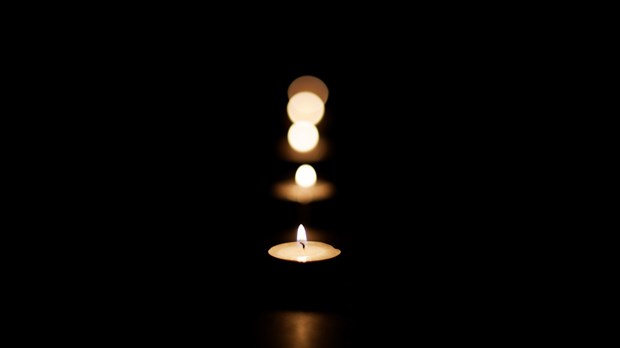The Gift of Darkness

“Someone I loved once gave me a box full of darkness. It took me years to understand that this, too, was a gift.” —Mary Oliver
A team from my church had been in the Dominican Republic for just over a week. Toward the end of our time there, our hosts took us to visit the medical clinic. As we were finishing our tour, we passed by their cataract room.
Cataract correction is a significant need in this community. Since the sun on the island is so intense and since so many of the people have outdoor jobs (like farming), the incidence of vision loss from cataracts is quite high. Almost imperceptibly over time, these people fall victim to the damaging rays until whatever sight they have is reduced to a small field of mostly blur.
Left unchecked, this condition can lead to being incapacitated, helpless, and unable to make even a small living. These poor, rural islanders walked into the clinic we were visiting with cloudy sight and emerged with 20/20 vision. The procedure let the light back in.
However, when the clinic had first opened, they had very few takers for this procedure. What changed? A handful of people who had the surgery went out into the rural parts of the island and told their stories.
These storytellers were so overwhelmed with joy and gratitude that their story could not be contained. Once these former patients became storytellers in the villages, cataract sufferers from all over the island began lining up at the clinic.
The Stories of Restoration
A glossy brochure and a health class taught in the towns received very little attention, but it was one person telling another—“I was blind, but now I see. And here’s where you can go to have that same experience”—that made the difference.
For those who hear the story—when they are in the same kind of pain—that story becomes life. It might be a nice story up to that point, or even mildly interesting. But when that story is personal, it becomes enthralling and necessary. The listeners hang on every word, hoping against hope it might be true for them too.
Stories are powerful, but stories from brokenness, stories that intersect with another’s pain—that, my friend, is life-changing stuff. That is gospel. Good news. Great news, really. It is the same power that puts us in the fight for justice, for serving the poor and the marginalized in the name of Jesus. It’s what keeps us, in the face of overwhelming odds, from going the other direction, using hope as the shield for the fight against human trafficking, poverty, and inequitable access to health care, education, and work.
In the first chapter of 2 Corinthians, Paul opens with a simple but deep reminder: God, “the Father of compassion and the God of all comfort . . . comforts us in all our troubles, so that we can comfort those in any trouble with the comfort we ourselves receive from God. For just as we share abundantly in the sufferings of Christ, so also our comfort abounds through Christ” (verses 3–5, NIV).
It is in our suffering, in our brokenness, in our troubles, that God invades our lives. In those times, both the sufferings and the comfort of Jesus can take root.
God, who is the source of all compassion, felt that compassion so deeply that he was willing to send his Son to be the ultimate compassion for us. In this way, he moved to offer us comfort—to offer us consolation and freedom from pain.
This is a good story, and I like a good story as much as the next person. In fact, I love getting caught up in a good telling of a dramatic turn of events or help that came when someone couldn’t see it coming. I really like stories of other people’s brokenness and how they experienced the depths of God in them.
But it’s my own story of brokenness that I don’t like—and I really don’t want you to know about it. And I don’t think I’m the only one who feels this way about their brokenness.
Cracks on the Surface
Our walls are up; our faces are painted. We smile, we nod, and we talk about pleasant things. We want the light to come in, at least theoretically. But we’d like it to come in while we’re smiling. We don’t like that the cracks have to appear in order for the light to get in.
Seriously, there has to be a better way. We could buy the light or borrow it. We could pretend we have it. But to have to be broken in order for God’s light to come in? Hmm, maybe not.
I think I’d rather stay in the dark about my darkness. I could pretend it’s not dark or, better yet, convince myself my darkness isn’t as dark as others’ darkness. So even though my toes are stubbed and my arms are bruised from knocking into things I couldn’t see, my denial is strong—and it’s more comfortable, thank you very much.
On the afternoon that we were at the Dominican cataract clinic, the doctor invited me into the exam room. A man who had undergone his surgery 14 days prior was there for a checkup.
The doctor unwrapped the bandage from around his eyes. He then finished his exam and declared the patient to be healing and on the way to complete health.
The man just sat there. His head began to move from side to side, and one big tear from each eye slid down the furrows of his face.
He clutched the doctor’s arm and said in a low voice, over and over, “I can see. I can see. I can see.” Then there was an outpouring of “Gracias” that lasted another minute.
His vision loss had come on so slowly that he’d hardly noticed how bad it was. After a while, he couldn’t imagine there was anything to be done about it. Then he heard someone tell him a story that changed his life.
Living in the Light
It’s easy to think that darkness is just in the dramatic things—blind eyes, the death of a child, a tragic diagnosis. But darkness is everywhere. And so is light. And darkness needs light.
Every day, we have the opportunity to be the light that dispels someone else’s darkness. It’s far more comfortable to stay in the dark and keep our brokenness to ourselves, but vulnerability has a way of shattering darkness like nothing else can.
Your story can bring light, healing, and freedom to someone who’s stumbling in the darkness. Our darkest moments are opportunities for us to become storytellers who share our brokenness with others, who invite people to see us and to see themselves clearly. In doing so, we hold out a hand to help others step into the light and be healed.
Read more articles that highlight writing by Christian women at ChristianityToday.com/Women
 Read These Next
Read These Next
 From Your DoorstepInsignificant me can make a significant difference in my neighborhood.
From Your DoorstepInsignificant me can make a significant difference in my neighborhood.
 Better Sex Begins in the BrainHow to think your way to greater intimacy
Better Sex Begins in the BrainHow to think your way to greater intimacy








 Homepage
Homepage